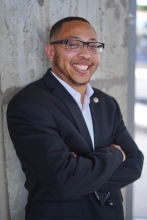MSE 298 Seminar (Zoom): Understanding the Properties of Inorganic-Organic Hybrid Nanoparticles for Materials Development

Assistant Professor
Department of Chemistry and Biochemistry
George Mason University
Zoom: Meeting ID 842 506 6501, Passcode 587901
Abstract: Inorganic-organic hybrid nanoparticles combine a metal inorganic core with an organic exterior that can range in size and composition. These nanoparticles represent an interesting state of matter with unique properties. Though the properties can change with composition and size, a fundamental understanding must be ascertained to employ them in materials. I will discuss our work investigating the fundamental chemistry and physics of a series of inorganic-organic hybrid nanoparticles. Using a combination of computational methods along with collaboration with experimentalist, insight into the structure-property relationship for aluminum, copper and gold hybrid nanoparticles has been gained. ReaxFF-MD has provided insight into the ligand interaction of gold nanoparticles in aqueous environments and molecular interactions, which is key for understanding properties in real-world environments. These studies not only lay a foundation for incorporation of hybrid nanoparticles in sensing devices, but also provide insight for their use as stand-alone materials.
Bio: Andre Clayborne is currently an assistant professor of chemistry and biochemistry at George Mason University. After receiving his doctorate from Virginia Commonwealth University in chemical physics in 2009, he held postdoctoral appointments at the University of Jyväskylä (Finland), Argonne National Laboratory and Kansas State University. He has held faculty appointments at the University of Missouri-Kansas City and Howard University (Washington, D.C.). Clayborne’s research focuses on understanding the properties of molecules and nanoscale inorganic-organic hybrid nanoparticles. The goal of his research is to accelerate the discovery of materials using computational approaches. He received funding for his research program nationally and internationally from the National Science Foundation, Natural National Science Foundation of China and the Academy of Finland. Clayborne is an advocate for professional mentorship and inclusive science education. He has mentored students and peers on a global scale in industry, government and education. For the past two years, he and colleagues from Howard University and Winston-Salem State University have hosted a BioNano Summer Workshop. The workshop aims to increase the number of minority students in the field of nanoscience with chemistry, physics and engineering backgrounds. Current endeavors include developing a week-long summer science education experience for students with autism and their educators; strengthening science and engineering education in rural communities; and continuing research using nanoparticles and molecules in technological devices.
Share
Related Content
| Attachment | Size |
|---|---|
| 157.31 KB |
Upcoming Events
-
EECS Seminar: Less Compute, More Intelligence – Efficient and Autonomous Generative AI and Agents
-
MAE 298: Microscopic Robots that Sense, Act and Compute
-
CBE 298 Seminar: Interface Modification for Electrocatalysis
-
CEE Ph.D. Defense Announcement: Machine Learning and Remote Sensing for Environmental Modeling - From Large-Scale Streamflow Forecasting to Malaria Risk Mapping
-
CBE Special Seminar: Operando Electrochemical Methods at Dynamic Energy Materials Interfaces
